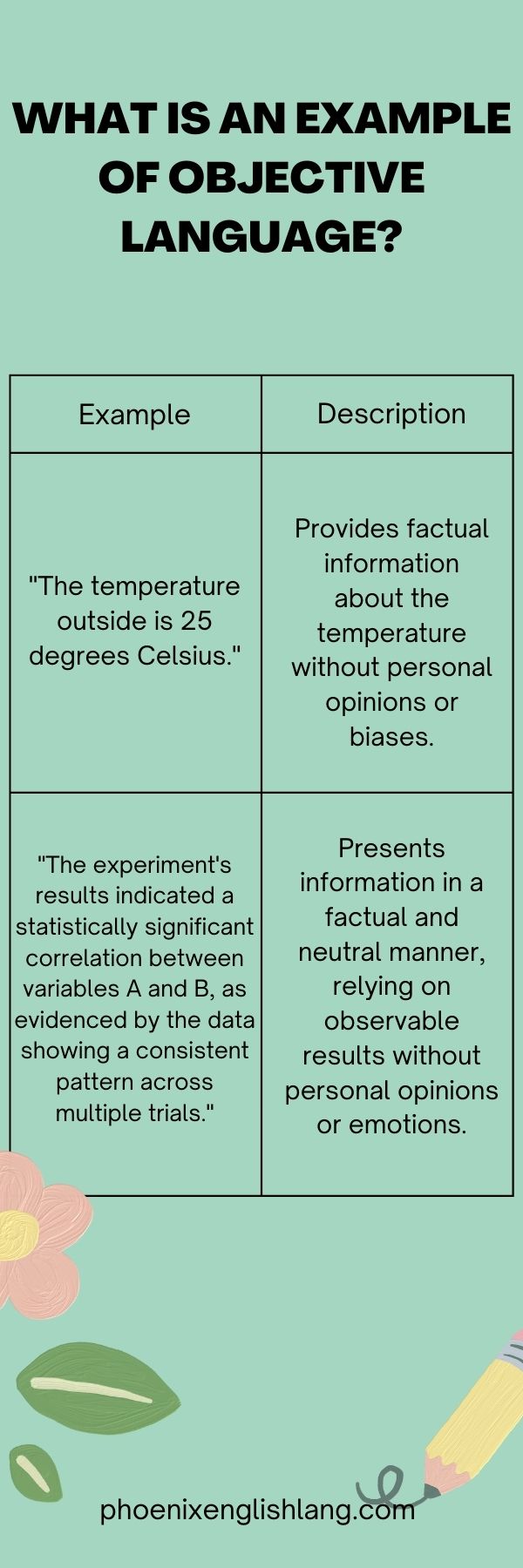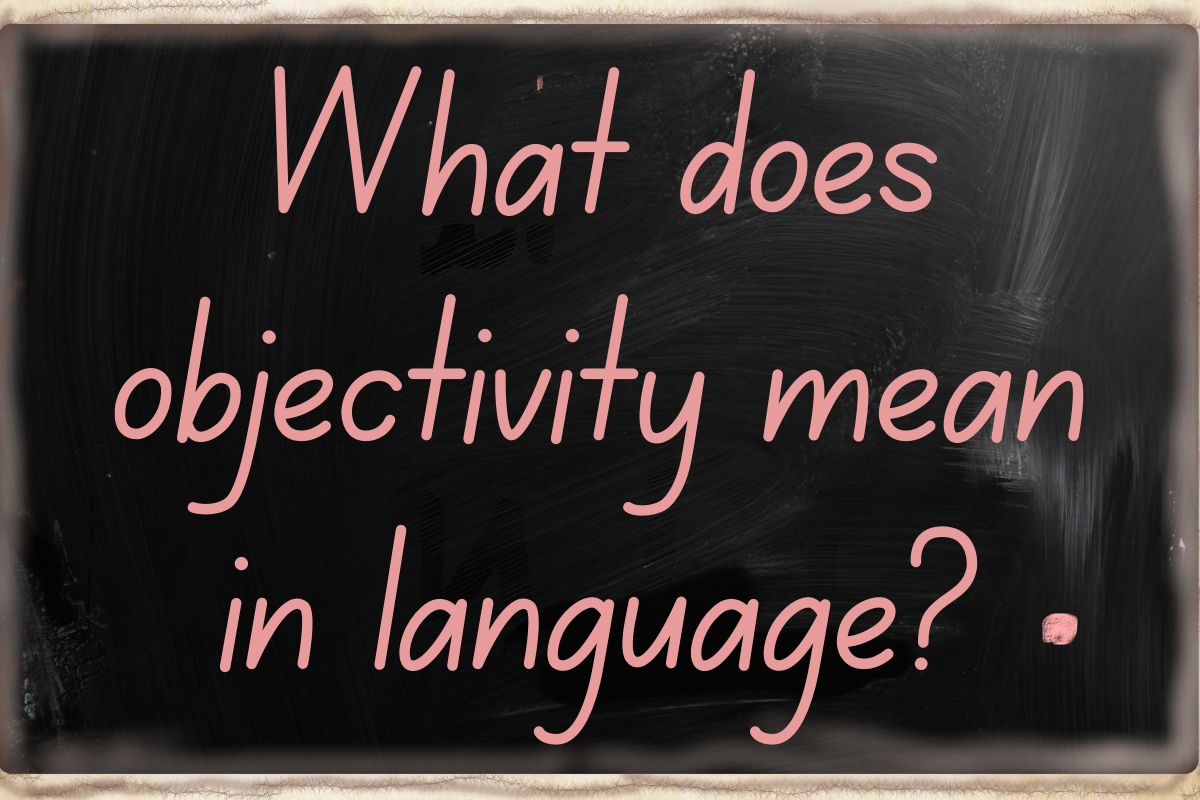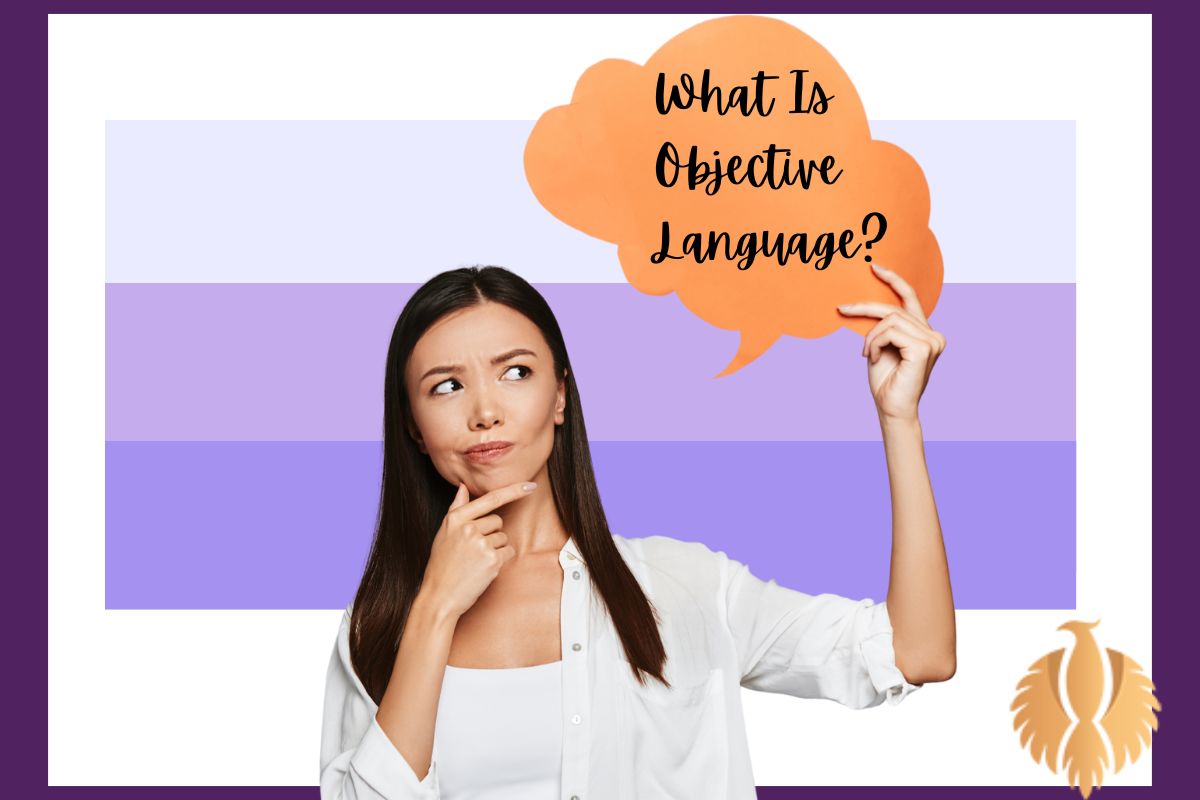objective language means a style of writing or speaking that is factual, unbiased, and does not reflect personal emotions, interpretations, or subjective opinions.
It is characterized by clear, straightforward communication that focuses on concrete information and evidence rather than personal beliefs or feelings.
As we navigate an increasingly complex world filled with diverse viewpoints and interpretations, the significance of using objective language becomes paramount in various fields, including academia, journalism, and professional communication.
You might also enjoy:Which of the Following: Definition + Complete Usage + Grammar

In 2025, the importance of objective language continues to grow, especially as society grapples with issues related to misinformation, polarization, and the need for clarity in discourse.
Objective language serves as a powerful tool for effective communication, allowing individuals to present facts and arguments in a way that minimizes bias and enhances understanding. By emphasizing neutrality and clarity, objective language fosters constructive dialogue and helps readers or listeners form informed opinions based on reliable evidence.
This comprehensive guide aims to delve deeper into the concept of objective language, exploring its defining characteristics, its significance in various contexts, and practical examples of how to apply it effectively. We’ll examine the distinctions between objective and subjective language, highlighting how the former can lead to more robust and credible communication.
Additionally, we’ll provide tips on how to cultivate an objective tone in your writing and speaking, making it a valuable resource for students, professionals, and anyone seeking to enhance their communication skills in a world where clarity and precision are increasingly critical.
As we move through this guide, you will gain a better understanding of why objective language is essential in fostering clear, respectful, and meaningful conversations.
Whether you are drafting a report, making an academic presentation, or engaging in public discourse, mastering the art of objective language will empower you to convey your ideas more effectively and contribute positively to discussions in your personal and professional life.
Let’s embark on this journey to understand the nuances of objective language and learn how to harness its power for clearer communication.
You Might Also Enjoy:Reinforce Vs Reenforce: 10 Differences + Examples [2025]
Here are 20 examples of objective language
The cat is black.
The book has 250 pages.
The car is parked in the driveway.
The tree is tall and has green leaves.
The temperature outside is 75 degrees Fahrenheit.
The movie starts at 7:30 PM.
The painting is displayed in the art gallery.
The dog barks loudly.
The cup is made of ceramic.
The phone has a cracked screen.
The pizza is topped with cheese and pepperoni.
The building is made of brick.
The flower blooms in the spring.
The river flows swiftly.
The shirt is blue and has short sleeves.
The coffee is hot.
The computer screen is bright and clear.
The pen writes smoothly.
The music is playing softly in the background.
The clock on the wall shows the correct time.
You might also enjoy:Where Does “How is your Day Going?” Originate From?
Here are 50 examples of objective language across various contexts:
Scientific Context
Research has shown that regular exercise improves cardiovascular health.
The experiment results demonstrated a significant increase in temperature when the substance was heated.
According to recent studies, the average global temperature has risen by 1.2 degrees Celsius since the late 19th century.
Data collected from the survey indicates that 75% of participants reported feeling less stressed after meditation.
The hypothesis was supported by the collected data, which showed a correlation between sleep quality and cognitive performance.
Academic Writing
This paper examines the impact of climate change on biodiversity in the Amazon rainforest.
The findings suggest that socioeconomic factors play a crucial role in educational attainment.
Historical records indicate that the population of the city grew significantly during the industrial revolution.
The author provides evidence to support the argument that poverty is linked to health disparities.
The analysis highlights the relationship between economic policy and unemployment rates.
Business Communication
The quarterly sales report indicates a 15% increase in revenue compared to the previous quarter.
Customer feedback reveals that 85% of clients are satisfied with the service provided.
The financial statement shows a net profit of $500,000 for the fiscal year.
Market research indicates a growing demand for renewable energy sources among consumers.
The training program resulted in a 20% improvement in employee productivity, as measured by performance metrics.
Journalism
Local authorities reported that the heavy rainfall resulted in flooding across several neighborhoods.
According to official statistics, the crime rate in the city decreased by 10% last year.
The government announced a new policy aimed at reducing carbon emissions by 40% by 2030.
In response to community concerns, the mayor held a town hall meeting to address public safety issues.
A recent poll found that 60% of respondents support the proposed changes to the healthcare system.
Educational Context
The curriculum emphasizes critical thinking and problem-solving skills in students.
Test results show that students who engage in extracurricular activities have higher academic performance.
Research indicates that early childhood education has long-term benefits for cognitive development.
Teaching methods that incorporate technology have been shown to enhance student engagement and learning outcomes.
The assessment criteria include knowledge comprehension, analytical skills, and creativity.
Technical Documentation
Follow the instructions carefully to install the software on your operating system.
The device operates at a voltage of 220V and a frequency of 50Hz.
As specified in the user manual, the maximum load capacity of the machine is 500 kg.
Regular maintenance is essential to ensure optimal performance of the equipment.
The application requires a minimum of 4GB of RAM for proper functionality.
Informational Text
Photosynthesis is the process by which green plants convert sunlight into chemical energy.
The capital of France is Paris, known for its art, fashion, and culture.
Water freezes at 0 degrees Celsius and boils at 100 degrees Celsius at sea level.
The human body consists of approximately 60% water, which is essential for various bodily functions.
The solar system consists of eight planets, with Earth being the third from the sun.
Legal Documents
According to the contract, the parties agree to terms outlined in Section 2 regarding deliverables.
The statute states that individuals must adhere to the regulations defined by the local governing body.
All agreements must be signed by both parties to be considered legally binding.
The claimant has the right to appeal the decision within 30 days of the ruling.
The lease agreement outlines the responsibilities of both the landlord and the tenant.
You might also enjoy:Interested In or On: The Differences + Examples [2025]
Medical Reports
The patient’s blood pressure was recorded at 120/80 mmHg during the examination.
Treatment for the condition includes a combination of medication and lifestyle changes.
The imaging results show no signs of fractures or abnormalities in the bone structure.
Follow-up appointments are necessary to monitor the patient’s recovery progress.
Vaccination has been shown to reduce the incidence of infectious diseases.
General Observations
The survey results indicate that lunch is the most popular meal of the day among participants.
During the winter months, temperatures tend to drop significantly in northern regions.
Observations show that traffic congestion peaks during rush hour in urban areas.
The majority of respondents prefer online shopping over in-store purchases.
Research indicates that high levels of stress can negatively impact mental health.
What is an example of objective language?

An example of objective language is “The temperature outside is 25 degrees Celsius.” This statement provides factual information without any personal opinions or biases.
An example of objective language would be: “The experiment’s results indicated a statistically significant correlation between variables A and B, as evidenced by the data showing a consistent pattern across multiple trials.”
This statement presents information in a factual and neutral manner, relying on observable results without expressing personal opinions or emotions.
Definition: Objective language refers to a style of communication that relies on facts, measurable data, and impartiality, avoiding personal feelings or opinions.
Example: “The study found that 70% of participants preferred option A over option B.”
Clarity and Precision: Objective language aims for clarity and precision, using specific terminology and straightforward expressions to convey information effectively.
Example: “The temperature measured 25 degrees Celsius, indicating a warm day.”
Lack of Subjectivity: Unlike subjective language, which is influenced by personal feelings and perspectives, objective language resists emotional influence.
Example: “Data shows that air pollution levels have increased by 15% in urban areas.”
Use in Professional Contexts: Objective language is commonly used in academic, scientific, and technical writing, where clear and unbiased information is essential.
Example: “The research methodology included randomized controlled trials to ensure reliability of results.”
Impacts on Persuasion: Objective language often lacks the persuasive qualities of subjective language, as it does not appeal to emotions but instead relies on logical reasoning.
Example: “Based on financial analyses, the company reported a 10% increase in revenue this quarter.”
Fact-Based Communication: The foundation of objective language is based on verifiable data and empirical evidence, ensuring that communicated information can be supported by facts.
Example: “The World Health Organization states that vaccines can prevent many diseases in children.”
Elimination of Bias: When using objective language, writers and speakers strive to eliminate personal biases, ensuring that their communication is fair and impartial.
Example: “Survey results indicate that there is no significant difference in satisfaction between the two services.”
Types of Objective Language: Some common forms of objective language include statistics, surveys, reports, and research studies, which present information in an unbiased manner.
Example: “According to the latest census, the population of the city is 1.2 million.”
Importance in Research: In academic and scientific research, objective language is essential for presenting findings, as it allows for the replication of results without personal interference.
Example: “The experiment was conducted under controlled conditions to isolate the variable.”
Neutral Tone: Objective language typically maintains a neutral tone, avoiding emotionally charged words and phrases that could influence the audience’s perceptions.
Example: “The candidate received 45% of the votes, while the opposition received 55%.”
Critical Thinking: The use of objective language encourages critical thinking by prompting the audience to consider the facts presented rather than being swayed by personal opinions.
Example: “The data indicates a correlation between exercise and improved mental health.”
Regulatory and Legal Contexts: In legal writing and regulatory documents, objective language is crucial for ensuring clarity and compliance with laws, enhancing the document’s efficiency.
Example: “The contract stipulates that all payments must be made within 30 days of invoice receipt.”
Descriptive Language: Objective language often employs descriptive language that focuses on observable characteristics rather than subjective interpretations or emotional descriptions.
Example: “The vehicle’s engine has a displacement of 2.0 liters.”
Case Studies: In business and social science, case studies often utilize objective language to portray scenarios clearly, allowing for objective analysis and decision-making.
Example: “The case study outlines the project’s objectives, implementation strategies, and outcomes over six months.”
Reporting: Journalistic standards in reporting often emphasize objective language; reporters are trained to present facts without inserting personal viewpoints to maintain credibility.
Example: “Authorities reported a 25% drop in crime rates this year compared to last year.”
Academic Writing Standards: Academic institutions endorse the use of objective language to uphold rigor and integrity in research and scholarship, ensuring that conclusions are based on evidence.
Example: “The findings support the hypothesis that increased study time leads to higher exam scores.”
Consistency: Objective language promotes consistency in communication, as it reduces the ambiguity that can arise from subjective interpretation.
Example: “The policy applies uniformly to all employees, with no exceptions.”
Trustworthiness: Objective language often leads to greater trustworthiness among audiences, as it fosters a perception of fairness and reliability in the presented information.
Example: “The audit confirmed that the financial statements were accurate and complied with accounting standards.”
Effective Communication in Diverse Contexts: Objective language is effective for audiences with diverse backgrounds, as it minimizes misunderstandings that personal interpretations may cause.
Example: “The report highlights key performance indicators relevant to all stakeholders.”
Role in Debates and Discussions: During debates and discussions, using objective language allows participants to focus on factual evidence rather than emotional appeals, promoting productive dialogue.
Example: “Statistical evidence shows that renewable energy sources have become 30% more efficient in the past decade.”
Limiting Hyperbole and Exaggeration: Objective language avoids hyperbole and exaggeration, ensuring that statements remain grounded in reality.
Example: “The employee completed the project on time, not three days early, as previously stated.”
Use of Passive Voice: Sometimes, objective language employs passive voice to depersonalize statements, focusing on the action rather than the subject, which can enhance neutrality.
Example: “The data was collected using a standardized questionnaire.”
Cultural Sensitivity: Objective language can foster cultural sensitivity by focusing on facts and data rather than emotions or biases that vary across cultures.
Example: “Research shows that dietary habits differ significantly across cultures, affecting health outcomes.”
Educational Practices: In education, objective language is key to teaching critical analysis skills, urging students to differentiate between fact and opinion.
Example: “The curriculum emphasizes evidence-based arguments rather than personal beliefs.”
Challenges of Objective Language: While striving for objectivity, communicators may face challenges, such as the difficulty in completely eliminating bias or the potential for misinterpretation of data.
Example: “While the survey aimed for anonymity, some participants still expressed discomfort with their responses.”
Use in Policy-Making: In policymaking, objective language is vital for drafting proposals and assessments that require empirical evidence and neutrality for informed decision-making.
Example: “The policy proposal incorporates statistical data on unemployment rates to inform recommendations.”
Influence on Audience Reception: The manner in which information is presented can shape audience reception; objective language tends to generate more analytical responses rather than emotional reactions.
Example: “Research findings indicate that financial literacy significantly influences investment decisions.”
Interdisciplinary Relevance: Objective language is applicable across multiple disciplines, from sciences to humanities, as each field requires clear communication of information.
Example: “In sociology, data collected from field studies are analyzed using objective statistical methods.”
Reflection of Reality: Objective language aims to accurately reflect reality, ensuring that represented data and information correspond to actual circumstances or conditions.
Example: “The weather report accurately reflects current conditions with a recorded temperature of 18 degrees.”
Development of Communication Skills: Mastering objective language can enhance overall communication skills, encouraging individuals to articulate their thoughts clearly and base arguments on evidence.
Example: “Students are trained to write research papers that rely on factual evidence rather than personal narratives.”
What is objective writing examples?
Objective writing example: “The research findings demonstrate a direct relationship between regular exercise and improved cardiovascular health, as evidenced by the consistent decrease in blood pressure levels among participants over a six-month period.”
This example maintains objectivity by presenting factual information, relying on measurable outcomes without incorporating personal biases or opinions.
You might also enjoy:What Kind of Vs What Kinds of – Differences + Examples [2025]
What does objectivity mean in language?

Objectivity in language refers to the use of unbiased, factual, and neutral language to convey information or express opinions.
It involves presenting information based on evidence, facts, and logical reasoning rather than personal feelings, opinions, or biases.
Objective language aims to provide a clear and balanced perspective, allowing the reader or listener to form their own judgments or interpretations.
It is commonly used in academic writing, journalism, scientific research, and other contexts where the focus is on conveying information accurately and impartially.
Objectivity in language refers to the use of impartial, factual, and neutral expressions when conveying information or opinions.
It emphasizes the importance of presenting data that is rooted in evidence, facts, and logical reasoning, rather than being influenced by personal feelings, beliefs, or biases.
The aim of using objective language is to provide a clear and fair perspective, allowing readers or listeners to form their own conclusions or interpretations.
In academic writing, upholding objectivity is crucial. Researchers and scholars strive to communicate their findings and arguments based on empirical evidence and logical reasoning.
This approach ensures that the information is reliable and can be verified by others. For instance, when writing a research paper, an author will present data, cite sources, and maintain a formal tone to preserve objectivity.
This method builds trust with the audience and enables the work to be scrutinized and validated by peers.
Journalism prioritizes objectivity, requiring journalists to report news without letting their personal opinions influence the narrative.
This means presenting a well-rounded view of events, including multiple perspectives, and sticking closely to the facts. For example, a news piece about a political event should include insights from various parties involved and steer clear of language that might show bias toward one side.
This approach is vital for providing the audience with accurate and impartial information, which is necessary for making well-informed choices.
Objectivity is also fundamental in scientific research. Scientists conduct experiments and studies to uncover truths about the natural world.
For their findings to be considered credible, they must be shared without personal bias. This involves using precise measurements, maintaining controlled conditions, and employing methods that can be repeated.
When writing scientific papers, researchers use objective language to explain their methods, results, and conclusions. This practice allows other scientists to replicate the studies and verify the results, thus enhancing the collective knowledge of the scientific community.
Objectivity in communication extends beyond formal settings. It plays a crucial role in everyday interactions, particularly in scenarios where clarity and fairness are vital.
For instance, in a business environment, using objective language can help ensure that all parties comprehend the terms of a contract or the specifics of a project. By steering clear of subjective language, the likelihood of misunderstandings and disputes can be reduced.
Nonetheless, achieving total objectivity can be difficult. Everyone has unique perspectives and experiences that can shape how they interpret and convey information.
To address this, it is essential to recognize potential biases and actively strive to lessen their influence. This may involve consulting a variety of information sources, being open about methodologies, and welcoming feedback and critique.
In summary, objectivity in language is about presenting information in a way that is unbiased, factual, and neutral. It is essential in academic writing, journalism, scientific research, and many other contexts where accurate and impartial communication is important.
By focusing on evidence, facts, and logical reasoning, objective language helps to provide a clear and balanced perspective, allowing the audience to form their own judgments and interpretations.
While achieving complete objectivity can be challenging, being aware of and actively working to minimize biases can help to ensure that communication is as fair and accurate as possible.
You might also enjoy:Too Cute Meaning Vs To Cute (To Vs Too) + Examples
Why use objective language?
Using objective language is important for several reasons. It helps to:
- **Maintain Credibility:** Objective language enhances the credibility of your writing by focusing on facts and evidence, making your message more trustworthy.
- **Promote Clarity:** Objectivity ensures that information is presented clearly and without personal bias, making it easier for readers to understand and interpret.
- **Encourage Critical Thinking:** By avoiding personal opinions, objective language encourages readers to form their own conclusions based on the presented evidence, fostering critical thinking.
- **Support Impartiality:** In fields like journalism, scientific research, and academia, objectivity is crucial to avoid favoritism and maintain a fair and unbiased perspective.
- **Facilitate Effective Communication:** Objective language minimizes misunderstandings, as it prioritizes the communication of facts and observations rather than subjective viewpoints.
Overall, using objective language contributes to effective, credible, and unbiased communication across various disciplines and contexts.
What is the objective best language?
The term “objective best language” is subjective itself, as the choice of language often depends on the specific context, audience, and purpose of communication.
However, in general communication, the use of clear, precise, and neutral language is often considered effective.
This means avoiding unnecessary jargon, being mindful of the audience’s level of understanding, and presenting information in a factual, unbiased manner. The objective best language varies based on the goals and conventions of the specific communication context.
You might also enjoy:How Are You Fairing or Faring? Differences + Examples
What is objective language for kids?

Objective language for children is straightforward, precise, and devoid of personal opinions. It conveys information clearly and without emotional influence or bias.
This kind of language is essential as it enables kids to grasp facts and details without being swayed by individual feelings or preferences.
For instance, rather than saying, “I prefer cats,” objective language would state, “Cats are a type of pet.” This simply shares information about cats without revealing any personal bias. It allows children to learn about cats independently of someone else’s viewpoint.
Employing objective language aids children in honing their critical thinking abilities. When kids receive facts instead of opinions, they can develop their conclusions and make educated choices.
For example, if a child is exploring various animals, objective language would outline the traits of each animal without implying that one is superior to another.
This approach empowers the child to determine which animal they find most fascinating or appealing.
In a classroom environment, educators frequently utilize objective language to guarantee that every student receives identical information. This is particularly vital in disciplines such as science and history, where facts and evidence play a key role.
For instance, a science teacher might state, “Water boils at 100 degrees Celsius,” instead of saying, “I believe water boils at 100 degrees Celsius.” The former is a factual statement, while the latter reflects an opinion.
By employing objective language, the teacher delivers clear and precise information that all students can depend on.
Objective language is equally essential for helping children grasp instructions and rules. When directions are presented straightforwardly and impartially, children are more inclined to comprehend and adhere to them.
For example, rather than saying, “I need you to clean up because it’s messy,” a more objective directive would be, “Please tidy up the toys and return them to the toy box.” This instruction is direct and clear, making it simpler for the child to understand what is required of them.
Moreover, objective language not only provides clarity and specificity but also avoids emotional or judgmental words.
For example, instead of stating, “This book is dull,” an objective remark would be, “This book discusses plants.” The first statement conveys a personal viewpoint, while the second merely shares information about the book’s subject matter.
By using objective language, we can assist children in concentrating on the facts and developing their own opinions.
Teaching children about fairness and equality can effectively be done through the use of objective language. When exploring various cultures or traditions, it’s crucial to share information that is both respectful and impartial.
Rather than claiming, “Our way of celebrating is the best,” a more objective approach would be to say, “Different cultures celebrate in unique ways.”
This method encourages children to recognize and value diversity without suggesting that one way is better than another.
To sum it up, using objective language with kids means delivering information that is clear, specific, and free from bias.
This practice aids children in grasping facts, honing their critical thinking abilities, and making well-informed choices. By embracing objective language, we equip children with the necessary tools to learn and develop in a fair and balanced environment.
What is an example of a content and language objective?
let’s consider an example for a classroom setting:
Content Objective: Students will be able to identify and describe the water cycle stages, including evaporation, condensation, and precipitation.
Language Objective: Students will practice using academic vocabulary related to the water cycle, such as “evaporation,” “condensation,” and “precipitation,” in both spoken and written forms.
In this example, the content objective focuses on what students should learn, while the language objective addresses the specific language skills they need to develop in the process.
How can we write objective content?
To write objective content, focus on presenting facts without personal bias. Use a neutral tone, cite reliable sources, and avoid emotional language. Strive for clarity and balance in your presentation of information.
How can we write objective content?
To write objective content, focus on presenting facts without personal bias. Use a neutral tone, cite reliable sources, and avoid emotional language. Strive for clarity and balance in your presentation of information.
What are learning objectives in simple words ?

Learning objectives are clear, concise statements that describe what learners should know or be able to do after completing a learning experience.
They guide instructional design and help assess the success of educational activities.
You Might Also Enjoy: Top 60 Most Common Simple Sentences In English
What is the objective language in academic writing?
Objective language in academic writing involves presenting information in a neutral and unbiased manner.
It avoids personal opinions, emotional language, or subjective statements. Instead, it focuses on factual content, logical analysis, and evidence-based arguments.
How do you start an objective statement?
To start an objective statement, clearly define the specific goal or outcome you aim to achieve.
Use concise language and focus on the key purpose or result you want to convey. This sets the tone for the rest of the statement.
How do you write a short objective?
Write a short objective by clearly stating the desired outcome in a brief and specific manner.
Be concise, focusing on what you want to achieve and avoiding unnecessary details. Keep it clear and actionable for a quick understanding.
What words should you start writing objectives with?

When writing objectives, you can start with action verbs that clearly communicate what learners should accomplish.
Common words include “demonstrate,” “analyze,” “create,” “solve,” “evaluate,” or “apply.” These verbs help convey the specific actions or skills you expect from the learners.
How do you write a short objective?
To write a short objective, begin with a clear and specific goal. Use concise language, focusing on the key outcome you want to achieve. Avoid unnecessary details, keeping the statement brief and to the point for clarity.
What is an example of objective writing style?
An example of an objective writing style is: “The experiment aimed to analyze the effects of temperature on enzyme activity in a controlled laboratory setting.
Results were measured quantitatively, allowing for an unbiased interpretation of the data.” This style maintains neutrality, presents facts, and avoids personal opinions or emotions.
You might also enjoy:Emersion Vs Immersion: Meaning, Differences, and Examples
What is a good objective sentence?
A good objective sentence is clear, specific, and actionable. For instance, “By the end of the training, participants will be able to apply statistical analysis techniques to analyze and interpret data sets effectively.”
This sentence outlines a measurable goal and indicates what learners are expected to achieve.
What should you avoid when writing objectives?
When writing objectives, avoid vague language, subjective statements, and personal opinions.
Also, steer clear of overly complex or convoluted sentences. Instead, focus on clarity, specificity, and measurable outcomes.
Additionally, be cautious about including multiple actions in a single objective, as this can lead to ambiguity.

Hi, welcome to my blog! My name is Omid and I am thrilled to have you here! I am an English language teacher with 12 years of experience and hold multiple international certifications (TESOL, IELTS, TOEFL, PTE, CELTA). Additionally, I hold a PhD in Applied Linguistics with a specialization in Teaching English as a Second Language (TESL), which fuels my passion for teaching English and assisting others in mastering the language. To me, nothing is more rewarding than helping individuals enhance their English language abilities through various methods. So, let’s embark on this journey of learning English together.




